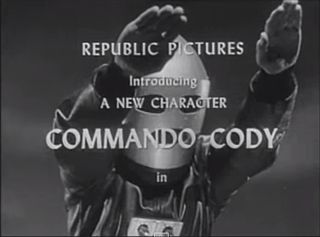
Commando Cody is the hero in two 12-chapter science fiction serials made by Republic Pictures, played by George Wallace in Radar Men from the Moon (1952) and Judd Holdren in Commando Cody: Sky Marshal of the Universe (1953).
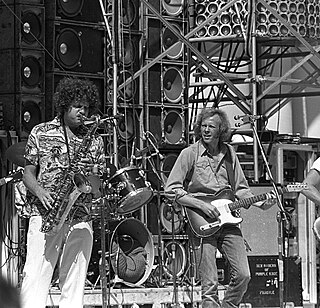
Commander Cody and His Lost Planet Airmen were an American country rock band founded in 1967. The group's leader and co-founder was pianist and vocalist George Frayne IV, alias Commander Cody.

Commando Cody: Sky Marshal of the Universe is a 1953 twelve-chapter movie serial from Republic Pictures, which began life as a proposed syndicated television series. It consists of twelve 25-minute sequential episodes directed by Harry Keller, Franklin Adreon, and Fred C. Brannon. It stars Judd Holdren, Aline Towne, Gregory Gaye, William Schallert, Richard Crane, and Craig Kelly.

Radar Men from the Moon is a 1952 Republic Pictures' 12-chapter movie serial, the first Commando Cody serial starring newcomer George Wallace as Cody, Aline Towne as his sidekick Joan Gilbert, and serial veteran Roy Barcroft as the evil Retik, the Ruler of the Moon. The director was Fred C. Brannon, with a screenplay by Ronald Davidson, and special effects by the Lydecker brothers. This serial recycles the flying sequences from Republic's earlier 1949 serial King of the Rocket Men. It was later released by Republic in 1966 as the 100-minute television film Retik the Moon Menace.

Zombies of the Stratosphere is a 1952 colorless Republic Studios serial directed by Fred C. Brannon, with a screenplay by Ronald Davidson, and special effects by Republic's Lydecker brothers. It was intended to be Republic's second serial featuring "new hero" Commando Cody and the third 12-chapter serial featuring the rocket-powered flying jacket and helmet introduced in King of the Rocket Men (1949). Instead, for reasons unknown, the hero was renamed "Larry Martin", who must prevent Martian invaders from using a hydrogen bomb to blow Earth out of its orbit, so that the Martians can move a dying Mars into a much closer orbital position to the Sun. As in Radar Men from the Moon, much of the screen time for each of the dozen chapters is spent on fistfights and car chases between the heroes and a gang of earthly crooks hired by renegade scientist Dr. Harding and his extraterrestrial colleague Marex to steal and stockpile the Atomic supplies needed for construction of the H-bomb.

Captain Video: Master of the Stratosphere is an American adventure horror science fiction film 15-chapter serial released by Columbia Pictures in 1951. It was directed by Spencer Gordon Bennet and Wallace A. Grissel with a screenplay by Royal G. Cole, Sherman I. Lowe and Joseph F. Poland, based on a treatment by George H. Plympton. The serial is unique for several reasons--- in particular, it is the only film serial ever based on a television program, Captain Video and His Video Rangers.

The Lost Planet is a 1953 American science fiction serial film 15-chapter serial which has the distinction of being the last interplanetary-themed sound serial ever made. It was directed by Spencer Gordon Bennet with a screenplay by George H. Plympton and Arthur Hoerl. It appears to have been planned as a sequel to the earlier chapterplay Captain Video: Master of the Stratosphere and shares many plot-points, props and sets, as well as some of the same cast. However, the Video Rangers do not appear, and their uniforms are instead worn by "slaves" created electronically by Reckov, the dictator of the Lost Planet with the help of mad scientist Dr. Grood and enslaved "good" scientist Professor Dorn.
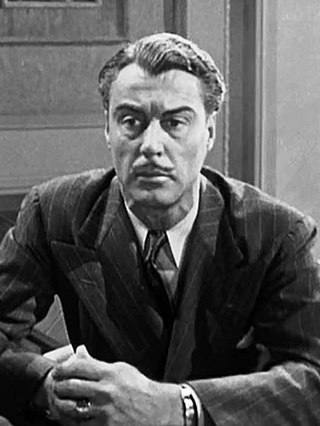
Tristram Chockley Coffin was a former film and television actor from the latter 1930s through the 1970s, usually in westerns or other B-movie action-adventure productions.
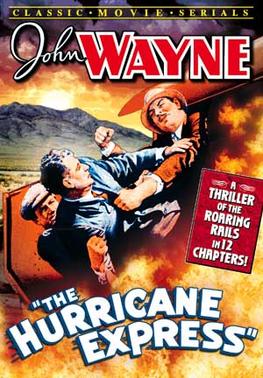
The Hurricane Express is a 1932 American Pre-Code 12-chapter Mascot Pictures film serial. Written by Colbert Clark, Barney Sarecky, Wyndham Gittens, George Morgan, and J.P. McGowan, the serial was directed by Armand Schaeffer and J.P. McGowan and produced by Nat Levine. The Hurricane Express stars John Wayne as aircraft pilot Larry Baker. Wayne goes after a mystery villain named "The Wrecker", who was responsible for a train crash that killed Baker's father.

Darkest Africa (1936) is a Republic movie serial. This was the first serial produced by Republic Pictures and was a loose sequel to a Mascot Pictures serial called The Lost Jungle, also starring Clyde Beatty. Mascot, and other companies, had been taken over in 1935 by Consolidated Film Laboratories and merged to become Republic. Producer Nat Levine was formerly the owner of Mascot Pictures.

The Purple Monster Strikes is a 1945 Republic Movie serial. It was also released as a Century 66 television film under the title D-Day on Mars (1966).
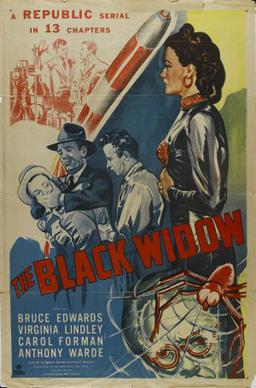
The Black Widow (1947) is a thirteen-chapter Republic serial film.
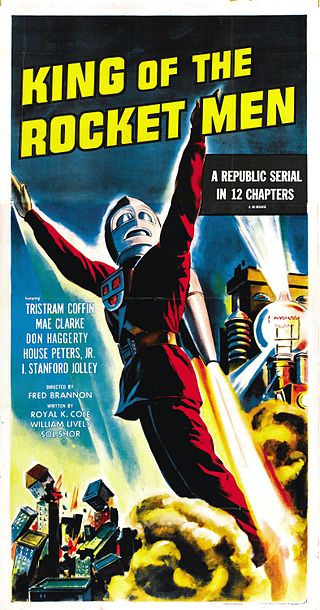
King of the Rocket Men is a 1949 12-chapter movie serial from Republic Pictures, produced by Franklin Adreon, directed Fred C. Brannon, that stars Tristram Coffin, Mae Clarke, Don Haggerty, House Peters, Jr., James Craven, and I. Stanford Jolley.

Flying Disc Man from Mars is a 1950 Republic Pictures 12-chapter black-and-white science fiction adventure film serial, produced by Franklin Adreon, directed by Fred C. Brannon, that stars Walter Reed, Lois Collier, Gregory Gaye, James Craven, Harry Lauter, and Richard Irving. Disc Man is considered a weak example of the serial medium, even compared to other post-World War II serials. In 1958 Republic edited the serial's 167 minutes of footage into a 75-minute feature, released under the new title Missile Monsters.
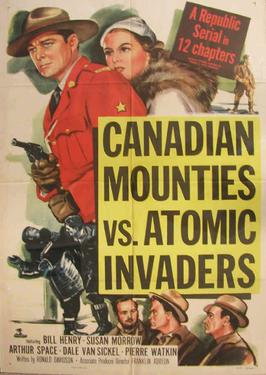
Canadian Mounties vs Atomic Invaders (1953) is a Republic Movie serial starring Bill Henry and both produced and directed by Franklin Adreon. It was the sixty-second serial produced by Republic. Despite the title, this is not a science fiction serial. The plot is a northern cold war adventure involving secret missile bases and a planned invasion of the United States.

Captain America is a 1944 Republic black-and-white 15-chapter serial film loosely based on the Timely Comics character Captain America. It was the last Republic serial made about a superhero. It also has the distinction of being the most expensive serial that Republic ever made. It stands as the first theatrical release connected to a Marvel character; the next theatrical release featuring a Marvel hero would not occur for more than 40 years. It was the last live-action rendition of a Marvel character in any medium until Spider-Man appeared in the Spidey Super Stories segment of the children's television series The Electric Company in 1974.
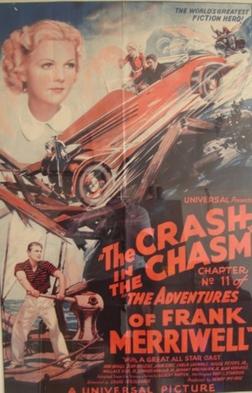
The Adventures of Frank Merriwell (1936) is a Universal movie serial based on the Frank Merriwell books by Gilbert Patten.

Bruce Gentry – Daredevil of the Skies (1949) is a 15-episode Columbia Pictures movie serial based on the Bruce Gentry comic strip created by Ray Bailey. It features the first cinematic appearance of a flying saucer, as the secret weapon of the villainous Recorder.
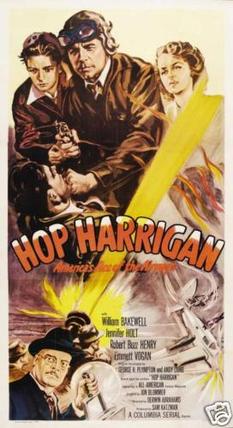
Hop Harrigan (1946) is a Columbia film serial, based on the Hop Harrigan comic books by DC Comics. The serial comprised 15 two-reel chapters with Derwin Abrahams as the director, and Sam Katzman, the producer. Columbia Pictures was one of the last Hollywood studios to continue in postwar years with the serial format. By 1947, Universal Pictures discontinued their serials, with only Republic Pictures and Columbia continuing with serials. The last serial was Columbia's Blazing the Overland Trail (1956).
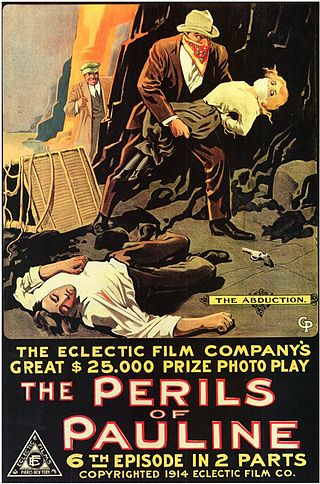
A serial film,film serial, movie serial, or chapter play, is a motion picture form popular during the first half of the 20th century, consisting of a series of short subjects exhibited in consecutive order at one theater, generally advancing weekly, until the series is completed. Usually, each serial involves a single set of characters, protagonistic and antagonistic, involved in a single story, which has been edited into chapters after the fashion of serial fiction and the episodes cannot be shown out of order or as a single or a random collection of short subjects.


















